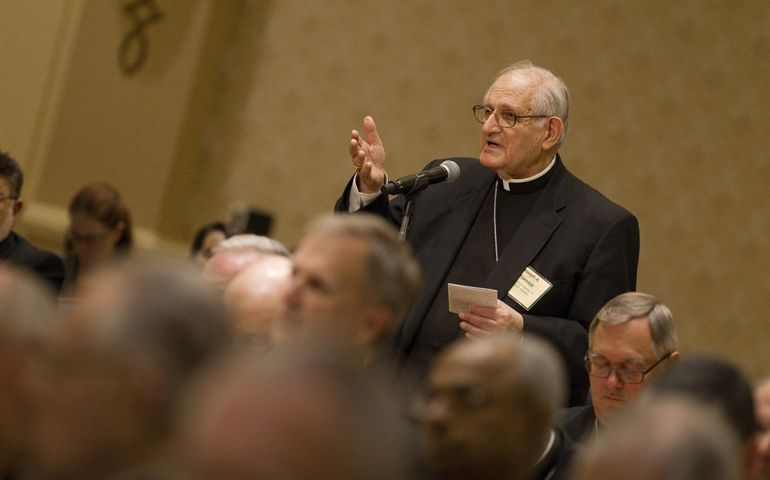
Archbishop Joseph A. Fiorenza of Galveston-Houston, Texas, address the U.S. bishops from the floor of their annual fall meeting Monday in Washington. (CNS/Nancy Phelan Wiechec)
Update: The U.S. bishops failed to pass a proposed statement on the economy, titled "The Hope of the Gospel in Difficult Economic Times." The document failed to get the required two-thirds needed for passage. The vote was 134, yes, 84 no, with nine abstentions.
Original story
Portents of a major social justice conflict among the U.S. bishops rose on the first day of the U.S. Conference of Catholic Bishops' annual fall meeting Monday when retired Archbishop Joseph Fiorenza of Galveston-Houston, Texas, denounced a proposed pastoral statement on workers, poverty and the economy as a betrayal of Catholic social teaching.
If approved in its draft form, the statement would be "lampooned" in the Catholic academic world, he said.
Fiorenza, a former USCCB president, said the proposed statement devotes only one short sentence to the long history of Catholic social teaching on workers' rights to organize in unions, to bargain collectively with their employers and to go on strike if their demands for just wages and working conditions are not met.
He noted that the proposed statement, "The Hope of the Gospel in Difficult Economic Times: A pastoral message on work, poverty and the economy," did not have a single reference, even in a footnote, to the bishops' landmark 1986 pastoral letter, "Economic Justice for All," which the bishops developed after years of consultation with economists and other experts. The letter addressed a full range of applications of Catholic social teaching to economic policy and practice in the United States.
"Where's the continuity?" Fiorenza asked.
"I am very disappointed, and I fear that this draft, if not changed in a major way," will harm the U.S. bishops' record on Catholic social teaching, he said.
"The title of this document is about work, and it seems you only gave one sentence to our social teaching ... on the right of workers to unionize," he said.
"One sentence," he added. "It's almost like it was an afterthought. But when you look at the compendium of the social teachings of the church, there are three long paragraphs on the right to organize, the right to collective bargaining, and the right to strike."
Those kinds of rights are "at the heart of our social teaching" on the rights and dignity of workers, he said.
He added that some conservative Catholic institutions, like the Acton Institute in Michigan, have tried to argue that Pope Leo XIII's landmark 1891 encyclical, Rerum Novarum, which spelled out workers' and private property rights and marks the start of modern Catholic social teaching, is a dated document that is "no longer applicable today."
"Every pope from Leo XIII to Benedict XVI has insisted upon the right to unionize," he said, but the proposed pastoral statement facing the bishops "gives short shrift" to that teaching.
Fiorenza said the proposed document fails to address adequately several other current issues of poverty and human dignity in U.S. economic policy by not giving adequate treatment to the issue of political prudential judgment as a criterion for church assessments of the morality of political policies or decisions.
"Sometimes prudential judgments can be neither prudent nor moral," especially when such judgments attack the poor and the common good, he said. He said he thought Bishop Stephen Blaire of Stockton, Calif., head of the bishops' domestic policy committee, and Bishop Richard Pates of Des Moines, Iowa, head of international policy for the bishops, "got it right" earlier this year when they publicly opposed Republican vice presidential candidate Paul Ryan's budget proposals as not in keeping with Catholic social teaching.
"Why don't we address [in the proposed statement] the growing gulf between the haves and the have-nots, beginning with Paul VI in Populorum Progressio [his 1967 encyclical letter, "On the Progress of Peoples"] and John Paul II, Benedict XVI: They speak about the growing gap between the haves and have-nots and the right to a redistribution -- redistribution has become a dirty word, yet the [recent popes] have said that this must take place," he said.
"There's not a word about this" in the proposed new statement on the economy, he said.
"I fear that this will not be an effective instrument" for the bishops to address the current woes in the U.S. economy or the people suffering from those problems, Fiorenza said.
The statement, written by a special drafting committee headed by Archbishop Allen Vigneron of Detroit, was due for a vote Tuesday at the bishops' meeting in Baltimore, which runs through Thursday.
Vigneron said some of Fiorenza's points and those raised by other bishops might be addressed through the amendment process.
Retired Auxiliary Bishop Peter A. Rosazza of Hartford, Conn., asked whether the drafting committee had consulted with an economist, which he said was one of the recommendations of the bishops in June.
Vigneron answered that they had not.
Retired Bishop Joseph M. Sullivan of Brooklyn, N.Y., said the document "doesn't address in any way the major shift in the American economy." He also said it ought to reference the 1986 document "to show the continuity of what we said then."
[Jerry Filteau is NCR’s Washington correspondent. His email is jfilteau@ncronline.org. Catholic News Service contributed to this report.]
Editor's Note: This article was revised to correct the date of Rerum Novarum.